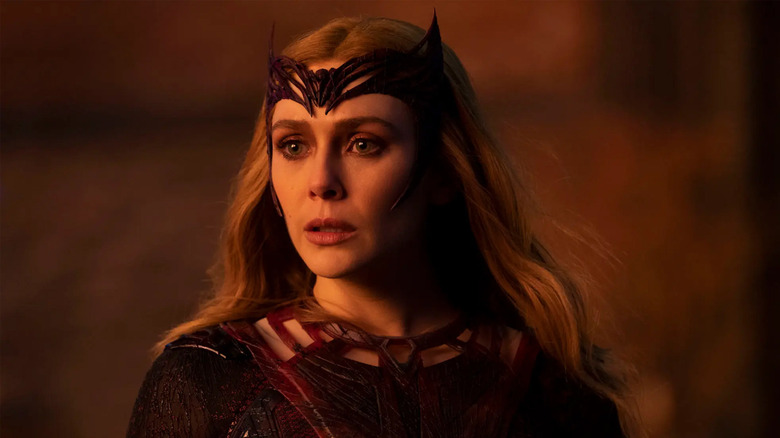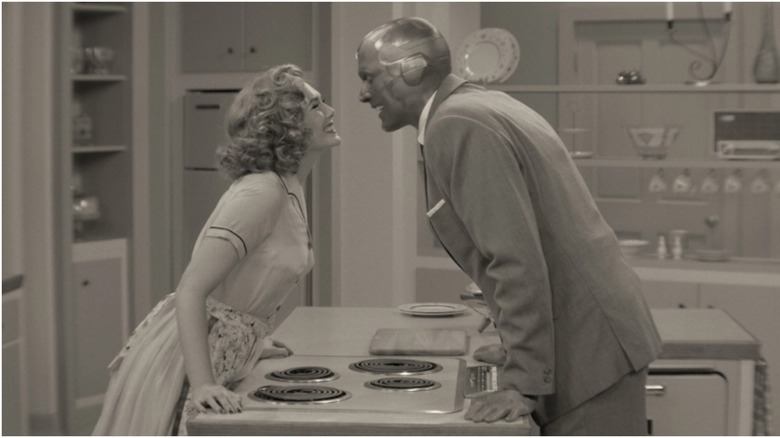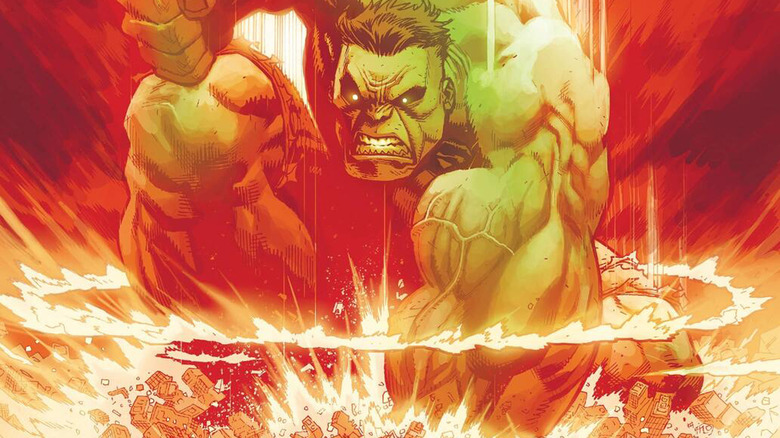
Major SPOILERS for "Doctor Strange in the Multiverse of Madness" follow.
If "WandaVision" was the MCU's "House of M," then "Doctor Strange in the Multiverse of Madness" is "Avengers Disassembled." Driven mad by the loss of her magically created children, Wanda Maximoff, aka the Scarlet Witch (Elizabeth Olsen), goes on a murderous rampage that threatens to tear apart the very fabric of reality.
In a vacuum, I actually quite enjoyed Wanda's villainous turn in "Multiverse of Madness." All the best, most horror-esque parts of the film center around the Scarlet Witch unleashing the darkest aspects of her chaos magic, amplified by the power of the Darkhold: her escaping the mirror dimension with her body contorted unnaturally; her possessing her alternate self, shot like an "Evil Dead" scene; her slaughtering the Illuminati single-handily; and, her chasing after Strange (Benedict Cumberbatch), America Chavez (Xochitl Gomez), and an alternate Christine Palmer (Rachel McAdams) like Michael Meyers wielding chaos magic instead of a knife. It's all so deliciously Sam Raimi, who brings a filmmaking verve the MCU's other directing alum don't measure up to.
Hats off to Elizabeth Olsen as well. Since "Avengers: Age of Ultron," she's been one of the best regular MCU players. Even armed with lacking material, she delivers. In "Multiverse of Madness," she appears to relish playing an outright villain, offering delicious camp even with just subtle emoting or a whisper. I came out of "the movie so excited to see her play an ax murderess in the forthcoming miniseries "Love and Death."
However, looking at the greater tapestry of the Marvel Cinematic Universe, this heel turn isn't an organic continuation from where we left off with the Scarlet Witch in "WandaVision."
Recycling The Lessons Of WandaVision

If you haven't seen "WandaVision," (which "Multiverse of Madness" assumes you haven't), it opened with Wanda reunited with her android lover Vision (Paul Bettany), last seen having his head torn open by Thanos during "Avengers: Infinity War." The two were living in a black-and-white sitcom world; even as things gained color and the pair had children, twins Tommy (Jett Klyne) and Billy (Julian Hilliard), something was clearly amiss.
It was eventually revealed that Wanda, grieving the loss of Vision and the life they would never share together, magically remade Westview, New Jersey into a world right out of the sitcoms she enjoyed as a child. The town's inhabitants were enslaved, forced to play their parts in her show, while Vision and the twins were just constructs animated by Wanda's memories and imagination.
"WandaVision" was about Wanda being unable to let go of the past. This was reflected in her illusion jumping forward to a new bygone decade in every episode. In the end though, she realized the error of her ways and learned to let go; she said tearful goodbyes to her children and husband then restored Westview. Monica Rambeau's (Teyonah Parris) assertion, "[Westview's citizens will] never know what you sacrificed for them," rang hollow; Wanda was only ending a problem she created. However, Wanda was genuinely repentant: "It wouldn't change how they see me."
Then, "Multiverse of Madness" features Wanda not attempting to make amends — far from it. She's hellbent on getting her children back, no matter whom she has to kill along the way. This is undeniable character regression for her; she unlearns the lesson she learned in "WandaVision" so she can learn it again at the climax of "Multiverse of Madness." While in "WandaVision" she was callously living in denial at worst, in "Multiverse of Madness" she's outright murderous. The main tether from miniseries to movie is that in the film, Wanda is using the Darkhold — a grimoire she acquired in "WandaVision." "Multiverse of Madness" insinuates the Book of the Damned has corrupted Wanda into its prophesied Scarlet Witch, but it's hard for said corruption to register when it takes place offscreen.
(Lack Of) Characters Arcs In The MCU

The repetition of Wanda's arc from "WandaVision" to "Doctor Strange in the Multiverse of Madness" is the latest example of a broader problem in Marvel movies: character arcs often don't carry over. MCU characters change from one movie to the next, but do they develop?
Take Tony Stark (Robert Downey Jr.), for example. "Iron Man 3" is about him realizing it's the man part that matters in Iron Man: he's the hero, not the suit. The film ends with him coming to terms with his PTSD from "The Avengers," destroying all his suits, and even having the arc reactor in his chest removed. Come his next appearance in "Avengers: Age of Ultron," he's back in the armor and once again mining from his alien invasion trauma to create a new robotic defense. "AoU" gives "Iron Man 3" the same treatment "Multiverse of Madness" gives "WandaVision.
Next, look at Stark's protege, Peter Parker (Tom Holland). "Spider-Man: Homecoming" ends with Peter turning down Tony's offer of Avengers' membership and a new suit so he can stay a Friendly Neighborhood Spider-Man. Oh wait, doesn't matter, because Marvel and Sony want Spidey in the next "Avengers" movie. Thus, in Peter's very next appearance, during "Avengers: Infinity War," he gets the suit he declined last time, is sworn in as an Avenger, and goes as far away from the neighborhood as could be.
This type of cyclical, regressive storytelling actually makes the MCU faithful to the comics, where it's common to see creators' conflicting views breed inconsistency. Look at the recent handling of the Incredible Hulk. Al Ewing and Joe Bennett's rightfully acclaimed "Immortal Hulk" ended with Bruce Banner finally at peace with his alternate personalities. The following run, Donny Cates and Ryan Ottley's simply titled "Hulk," opens with Banner and the Green Goliath once again at war, no explanation in sight.
The MCU has given us the lesson comics have taught us again and again: a shared universe overseen by multiple creators with different aims and interpretations will never totally congeal. This is even worse because Marvel's characters, in both comics and film, are ultimately owned by corporations, not creators. Said corporations maneuver characters like chess pieces with the goal of maxing out their bottom line, good storytelling be damned.
In an ideal world, the way to reconcile these discrepancies would be to take every installment on its own terms, but that becomes impossible to do when everything is interconnected. If the Marvel comics universe hasn't solved this problem in 60 years of publication, it's not likely the MCU will be able to in less than 20.
Read this next: 11 Marvel Comics Villains We Really Want To See In The MCU
The post Doctor Strange in the Multiverse of Madness Totally Betrays Wanda's Character Arc in WandaVision appeared first on /Film.
0 Commentaires